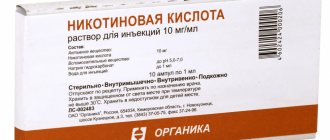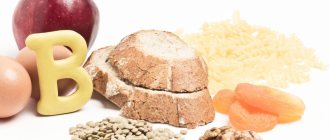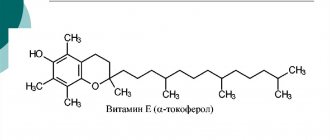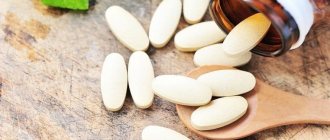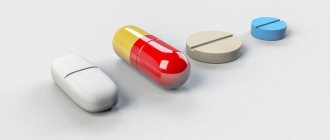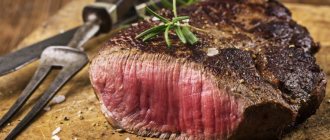Pharmacodynamics and pharmacokinetics
Nicotinamide - what is it?
Vitamin remedy Nicotinamide has a structure close to nicotinic acid . Its synonyms also include vitamin PP .
This substance is an important component necessary for the full course of redox processes occurring in the cell. The vitamin also takes part in the metabolism of fats, amino acids, purines, proteins, tissue respiration and glycogenolysis . At the same time, there is no pronounced vasodilating effect, redness and irritation on the skin, or “flushes” of blood. In addition, the drug has an antipellagritic effect. Nicotinamide is characterized by rapid absorption and metabolism.
Vitamin in food
Nicotinamide is found in many foods: in plant foods in the form of nicotinic acid, in foods of animal origin in the form of amide. TOP 10 foods rich in vitamin B3 (table):
| Product name | Amount of PP, mg per 100 g of product |
| Peanut | 18,9 |
| Beef liver | 17,2 |
| Tuna | 15,5 |
| Turkey | 13,3 |
| Pistachios | 13,2 |
| Chicken fillet | 12,5 |
| Rabbit meat | 11,6 |
| Mackerel | 11,5 |
| Pine nuts | 8,3 |
| Squid | 7,6 |
Nicotinamide as a substance is quite stable: it does not deteriorate during long-term storage, freezing, or exposure to solutions with an acidic or alkaline environment. But the acid quickly loses its beneficial properties under the influence of high temperatures - when heated, its content decreases by 35-45%. Therefore, it is not always possible to obtain the daily requirement with food.
Details about natural sources of niacin amide (video):
Live healthy! Super food with nicotinamide. (07/20/2017)
Indications for use
Nicotinamide is prescribed for hypo- and avitaminosis of the RR and a high need for it associated with:
- inadequate and unbalanced nutrition;
- malabsorption;
- rapid weight loss;
- diabetes mellitus;
- prolonged fever ;
- gastrectomy;
- diseases of the hepatobiliary region - hepatitis, cirrhosis;
- hyperthyroidism;
- chronic infections;
- gastrointestinal diseases;
- malignant tumors;
- diseases of the oropharyngeal region;
- prolonged stress;
- lactation, pregnancy.
In addition, this drug is actively used in the treatment of acute alcohol conditions and addiction.
Contraindications for use
It is recommended to refrain from consuming this vitamin if:
- hypersensitivity;
- peptic ulcer of the stomach and duodenum.
Caution in treatment requires such disorders as:
- hemorrhages;
- diabetes;
- gout;
- glaucoma;
- hyperuricemia;
- arterial hypotension;
- liver diseases;
- hyperacid gastritis.
special instructions
In addition to taking a vitamin supplement to prevent hypovitaminosis RR , it is necessary to adhere to a balanced diet, including foods rich in this vitamin in the diet. These include: yeast, liver, egg yolk, nuts, milk, fish, meat, legumes, buckwheat, chicken, unrefined grains, ground nuts, green vegetables, protein products and so on.
As a result of heat treatment, vitamin PP is retained in milk.
Taking the vitamin requires monitoring liver function. To prevent the development of fatty liver disease, you need to supplement your diet with foods saturated with methionine , take a drug with methionine or other lipotropic drugs.
The drug is not used as a lipid-lowering agent. You can reduce the irritating effect on the mucous membranes of the gastrointestinal tract if you take the tablets with milk.
Instructions for use
In case of severe hypovitaminosis, to obtain the age-specific norm, vitamin PP is prescribed orally, 2 capsules/tablets 2-4 times a day, depending on the patient’s condition. For diseases of the skin, hair, and dyslipidemia, it is enough to drink 1 capsule 2 times a day. In severe forms of atherosclerosis and the patient does not have significant negative reactions to the drug, the dosage can be increased to 2 g of the active substance per day.
According to the manufacturer's instructions, when taking the vitamin orally, you must follow the following rules:
- take supplements with meals to slow down the absorption of the active form of the substance and minimize side effects;
- Do not take the drug with hot or caffeinated drinks;
- Do not take a bath or hot shower within 1 hour after taking the tablets.
Sometimes patients are prescribed niacinamide injections. Recommended doses are 1 ml of solution 2-3 times a day intravenously, subcutaneously or intramuscularly. When administered intravenously, the drug is administered slowly so as not to harm the body and not provoke orthostatic hypotension.
Overdose
Taking high doses of the vitamin can lead to the development of: arrhythmia, dizziness, diarrhea , dry skin and mucous membranes of the eyes, hyperglycemia, glucosuria, thirst, hyperuricemia, myalgia, nausea, vomiting , and so on.
Long-term use of vitamin PP sometimes causes fatty liver degeneration and cholestasis .
Niacin (nicotinic acid) is a water-soluble vitamin, the deficiency of which leads to pellagra, a disease primarily affecting the skin, gastrointestinal tract and nervous system.
Synonyms Russian
Nicotinic acid, vitamin PP, antipellagric factor, 3-pyridinecarboxylic acid.
English synonyms
Niacin, vitamin B3, nicotinicacid, vitamin PP, Pyridine-3-carboxylicacid, 3-pyridinecarboxylicacid, Apelagrin, Pellagrin, Akotin, Daskil, Pelonin, Acidumnicotinicum.
Research method
High performance liquid chromatography with tandem mass spectrometry.
Units
ng/ml (nanograms per milliliter).
What biomaterial can be used for research?
Venous blood.
How to properly prepare for research?
- Do not eat for 2-3 hours before the test; you can drink clean still water.
- Do not smoke for 30 minutes before the test.
General information about the study
Niacin (vitamin B3) is a water-soluble vitamin that is converted into nicotinamide in the human body. It is part of the coenzymes of some dehydrogenases: nicotinamide adenine dinucleotide (NAD) and nicotinamide adenine dinucleotide phosphate (NADP). In these molecular structures, nicotinamide acts as an electron donor and acceptor and participates in vital redox reactions that are catalyzed by dozens of different enzymes. As a cofactor of enzymes, nicotinamide is involved in the metabolism of proteins, fats and carbohydrates, purine metabolism, tissue respiration, and glycogen breakdown.
Niacin has a hypolipidemic effect, dilates small blood vessels and improves microcirculation. It reduces the concentration of total cholesterol, apolipoprotein A, triglycerides, low-density lipids and increases the level of high-density lipids, which have anti-atherogenic properties (prevent the formation of atherosclerotic plaques in blood vessels). It also increases the fibrinolytic activity of the blood and prevents thrombus formation, reducing platelet aggregation.
Niacin is primarily supplied to the body through food. It is found in rye bread, buckwheat, beans, nuts, unrefined grains, yeast, egg yolk, milk, meat, liver, kidneys, mushrooms, pineapple. In the food industry it is used as a food additive E375. Satisfying the body's need for niacin is also ensured by its synthesis from the essential amino acid tryptophan in the presence of vitamin B6, riboflavin and iron by the intestinal bacterial flora.
If there is insufficient intake of niacin, the skin, digestive organs and nervous system are affected. A deficiency of this vitamin leads to pellagra, a disease that manifests itself with diarrhea, dermatitis, dementia and is life-threatening without treatment. Skin lesions with pellagra are erythema resembling sunburn, especially pronounced on parts of the body exposed to sunlight; Pigmentation gradually increases and the skin thickens. Nausea, constipation or diarrhea occurs, the tongue becomes bright red, apathy, fatigue, depression, headache, disorientation appear, and sometimes the patient even loses memory. The development of dementia with delirium is preceded by increased irritability, depression and anorexia.
When consuming high doses of vitamin B3, hyperemia of the skin of the face and upper half of the body, dizziness, paresthesia, arrhythmia, diarrhea, dry skin and mucous membrane of the eyes, and itching occur. Long-term use of niacin can lead to fatty liver, decreased glucose tolerance, papilledema, asthenia, increased blood concentrations of uric acid, ALT, LDH,. During treatment with nicotinic acid preparations, it is recommended to monitor liver function.
What is the research used for?
- To diagnose vitamin B3 deficiency in the body.
When is the study scheduled?
- With clinical signs of pellagra (dermatitis, diarrhea, dementia, glossitis);
- with malabsorption syndrome due to diseases of the gastrointestinal tract;
- with Hartnup syndrome (hereditary pathology of the absorption of tryptophan and some other amino acids from the intestine).
What do the results mean?
Reference values
| Vitamin B3 (niacin) | 3.00 - 36.00 ng/ml |
| Vitamin B3 (nicotinamide) | 5.20 - 72.10 ng/ml |
Reasons for increased vitamin B3 levels:
- oral or parenteral administration of nicotinic acid preparations.
Reasons for low vitamin B3 levels:
- Insufficient intake of vitamin B3 into the body: Hartnup disease (a hereditary disease accompanied by impaired absorption of certain amino acids, including tryptophan);
- inadequate and unbalanced nutrition (including parenteral);
- gastrointestinal diseases accompanied by malabsorption syndrome (pancreatic pathology, celiac disease, persistent diarrhea, Crohn's disease);
- condition after surgical treatment of gastrointestinal diseases (for example, gastrectomy).
- prolonged fever;
What can influence the result?
The level of niacin in the body is reduced by: isoniazid, phenytoin, valproic acid, azathioprine, chloramphenicol, cycloserine, fluorouracil, levodopa, mercaptopurine.
Analogs
Level 4 ATC code matches:
Medobiotin
Calcium Pantothenate
Volvit
Alpha Tocopherol Acetate
Riboflavin
Pyridoxine Hydrochloride
Pyridoxine
Vitrum Vitamin E
Analogs are represented by the following drugs: Aminicotin, Benikot, Endobion, Niacevit, Bepella, Niacinamide, Nicofort, Nicotol, Nicotinic acid, Nikamide and Pelmin.
Also have a similar effect: Neurovitan, Folic acid and Bepanten.
Reviews about Nicotinamide
In most cases, reviews of Nicotinamide are left by people who take it during pregnancy or to prevent vitamin deficiency . Pregnant women note that this drug is well tolerated and highly effective. It is also often reported that taking this vitamin improves the condition, appearance and quality of hair and nails.
Nicotinamide is often included in the diet of athletes, bodybuilders and athletes. At the same time, it is described as an excellent anabolic steroid that helps quickly and effectively build muscle mass.
Thus, there are only positive opinions about this vitamin product. However, experts remind that taking the drug without indications and without consulting a doctor is not recommended.
Use of nicotinamide
The wide range of pharmacological effects of the vitamin is due to its participation in all metabolic reactions in the form of the coenzyme dehydrogenase. Acid is needed for the processes of protein and amino acid synthesis, tissue respiration, and glycolysis. The substance is beneficial for reducing the level of harmful lipids in the blood, improves microcirculation, and normalizes the coagulation properties of plasma.
For skin problems
Niacin is a powerful antioxidant; it protects the skin from exposure to ultraviolet radiation and harmful chemical factors. The product effectively eliminates peeling and smoothes wrinkles. Niacin is needed to even out the complexion, get rid of age spots and post-acne.
For hair beauty
Nicotinamide is found in many shampoos and conditioners; it helps restore beauty and shine to hair, improves blood supply and trophism of hair follicles. Acid promotes rapid restoration of hair structure after exposure to damaging factors - constant styling with a curling iron, chemical perms.
Read more about the effects of nicotinic acid on hair here.
Against melanoma
According to the results of a study by Israeli scientists, vitamin nicotinamide can reduce the risk of malignant transformation of epidermal and dermal cells. The rate of skin cancer progression in patients taking niacin for a long time decreased by 23%. The vitamin acts as a natural antioxidant, destroying free radicals and mutant cells in the body.
For kidney diseases
Nicotinamide is not effective enough in acute forms of diseases of the urinary system, but it can be used in chronic renal failure. The compound normalizes the rheological characteristics of the blood, improves blood flow in the kidneys, stimulates the formation and filtration of urine.
Nature's Way, Nicotinamide, 500 mg, 100 Capsules
589 rub.
More details
For diabetes
Diabetes mellitus in most cases is accompanied by abnormalities in the blood lipid profile and metabolic syndrome. Niacin is a third-line treatment for diabetes due to its ability to reduce plasma atherogenic lipid levels. Nicotinamide should be prescribed only under strict monitoring of blood glucose levels. The indication for use of the supplement is a compensated form of diabetes.
